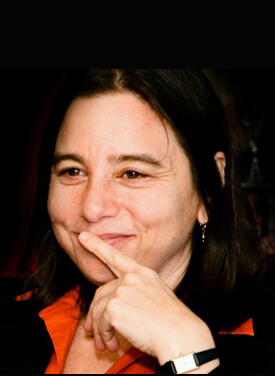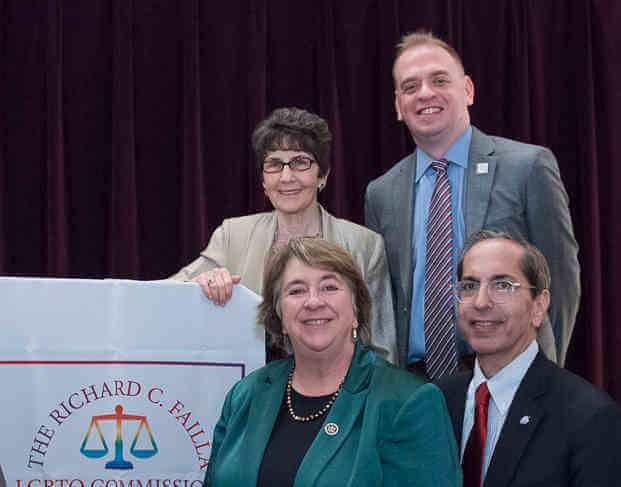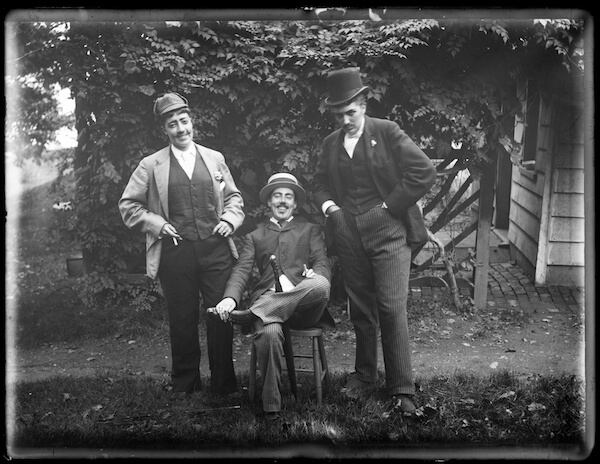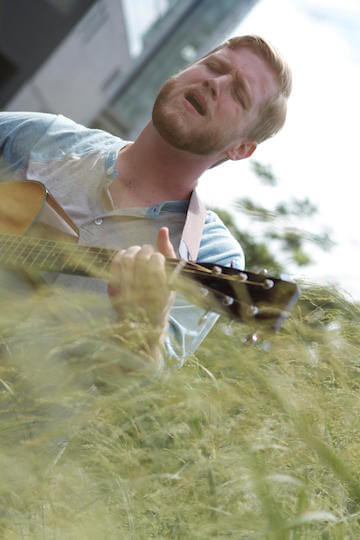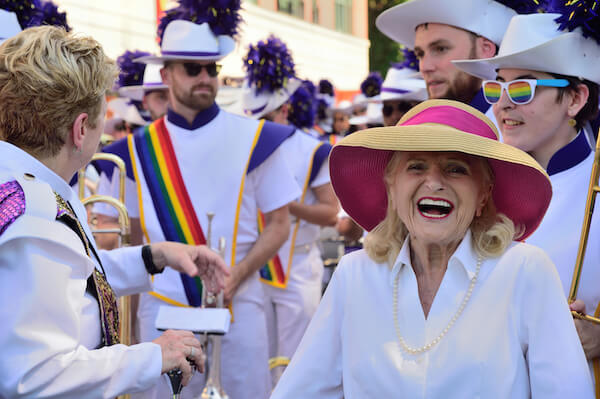Sarah Schulman. | DUKE UNIVERSITY PRESS
Sarah Schulman’s new book, “Israel/ Palestine and the Queer International,” is a book that some Very Important People don’t want you to read. To their shame, that group ranges from the leadership of New York’s LGBT Community Center, which banned Schulman from reading from her book and answering questions about it, to the openly gay trade union leader Stuart Appelbaum, president of the Jewish Labor Committee, and the wealthy gay porn video merchant Michael Lucas.
Since gay people have always been — and continue to be — the targets of censorship, it is indeed bizarre, to say the least, to see Glennda Testone, the Center’s executive director, arrogate to herself and her colleagues the right to decide what you can or cannot be trusted to read or hear.
But quite aside from this craven insult to free speech by people who are supposed to represent you, the fact that Schulman was the target of their censorship is utterly mind-boggling. For Sarah Schulman has been, for her entire career, a shining adornment of queer culture who has made monumental contributions to advancing and enlightening our struggles. I speak not only of her 17 previous books and her reams of articles — which won her a Stonewall Award from CUNY’s Center for Lesbian and Gay Studies for her life’s work — but of her tireless and consistent activism since the mid-‘70s.
Leading Jewish lesbian intellectual tackles problem long too easy to avoid
She was a principal founder of the Lesbian Avengers, an important part of ACT UP, a key leader in the long fight to have gays and lesbians allowed to march openly in New York’s St. Patrick’s Day Parade, and the co-founder of both MIX, the experimental queer film and video festival that she has helped run for 25 years, and of the ACT UP Oral History Project that preserves the memory of activists who died fighting against that plague.
A novelist, playwright, scenarist, historian, essayist, and gay theoretician, she is one of our most creative, talented, and stellar intellectuals. She’s a distinguished professor of humanities at CUNY, a fellow of the Institute for the Humanities at New York University, and a member of the Advisory Council of Harvard’s Kennedy School Carr Center for Human Rights and Social Movements.
Compared to Schulman, those who tried to censor her are at a distinct intellectual and moral disadvantage. She is the epitome of the public intellectual engagé, and her work and example have inspired legions of queers, myself included.
That the Center, after an enormous public outcry —and the involvement of gay elected officials (since the Center receives public funding) — decided to rescind the ban on Schulman does not lessen the reprehensible character of their initial decision. We should demand that Testone, who has no background in community organizing, resign and that the current board be replaced with one unequivocally committed to free speech for all queers, whether their opinions are popular or not. That is the essence of liberty and of civilized discourse.
And although the Center rescinded its ban on Schulman, it maintains a new kind of “loyalty oath” — shades of the McCarthyite 1950s! — in which those who use the Center’s facilities are required to sign a pledge not to engage in “hate speech.” But this, too, is censorship — for what some blinkered fools call “hate speech” is nothing less than legitimate criticism of Israel’s oppression of the Palestinian people. The Center’s “oath” is itself just another form of censorship and an insulting one, for it means that you are too stupid to decide for yourself which speech is valid and worthy of discussion and which is not.
It’s not hard to see that the Center’s interests would be served by banning Schulman from reading from her newest book — since a chapter is devoted to an earlier act of Center censorship in banning a discussion forum sponsored by Siege Busters, an organization opposed to the Israeli occupation of Palestinian territories that has many queers in its leadership.
“Israel/ Palestine and the Queer International,” published by Duke University Press, is an important book, and one that merits the widest possible queer readership.
One of the many things that make it so is her exposition of the problem of “homonationalism.” As Schulman writes, “homonationalism” is a term “used regularly in academic and activist circles in western Europe and the Middle East… [It] describes a contemporary phenomenon, most prevalent in northern European countries such as Germany and the Netherlands where white gays, lesbians, and bisexuals (and in some cases transsexuals) have won a full range of legal rights. Through marriage, parenthood, and family, they become accepted and realigned with patriotic or nationalist ideologies of their countries. Instead of being feared as the threat to family and nation that they were once seen to be, this new integration under the most normative of terms is held up as a symbol of that country’s commitment to progress and modernity. Some then identify with the racial and religious hegemony of their countries and join movements opposing immigration or racial and cultural differences. They construct the ‘other,’ often Muslims of Arab, South Asian, Turkish, or African origin, as ‘homophobic’ and fanatically heterosexual.”
The Center’s censorious actions described above are just one of many expressions of this rising tide of homonationalism that Schulman cites.
But this book is more — it is the story of Schulman’s own journey as a Jewish intellectual and activist in discovering and finally opposing Israel’s violations of human rights and international law in its treatment of the Palestinians, and her emergence from what she calls her “denial” of these stark and disturbing realities to become an active supporter of BDS.
“Like many queer people, “ Schulman writes, “I first imagined that BDS stood for bondage/ domination/ submission. But actually it stands for boycott/ divestment/ sanctions, a strategy chosen by Palestinian academics and intellectuals in the occupied territories… a nonviolent strategy, modeled on the South African divestment experience, to change Israeli policy through economic and cultural pressure.”
Schulman, in recounting her childhood in a family with cousins in Israel that lost members to the Holocaust and was infused with Yiddishkeit, takes us through her voyage of discovery and ultimate engagement with the cause of Palestinian rights. It is all done with extraordinary intellectual rigor and self-criticism.
I have always believed that the search for truth begins with a Sartrean transparency in all things, including about one’s own self — and it’s an exciting pleasure to watch Schulman’s mind at work here. She not only asks questions, she asks questions about the questions one asks — or doesn’t ask. And then asks, “Why?” The result is a model of how a responsible intellectual should approach any problem or challenge.
With a journalist’s eye for the telling detail, she takes us through her voyage to Israel and Palestine and her encounters with queer Israeli boycott activists and the nascent Palestinian queer organizations in the West Bank.
Schulman writes, “The process of coming into understanding is mesmerizing and magnetic. The degradation of Palestine and the waste of its people’s human potential, the destabilizing of the eight million Palestinians in the global diaspora, was one of the starkest, clearest examples of injustice in my contemporary world. And even though it was being done with my [tax] money and in my name, and in a sense by the people I know, love, and am related to, it was intellectually easy to avoid. There was simply no one to insist on our attention. Palestine… could not compete in media culture. It was too real, and we were too false.”
A century and a half ago, a bearded German Jewish philosopher now out of intellectual favor sat in London’s national library and wrote, “Philosophers have only analyzed the world — the point, however, is to change it.” This is something that Schulman-as-activist has always understood. Thus, her reaction to her discoveries on her voyage to Israel and Palestine was to organize a US speaking tour by Palestinian queer activists she had met. This book is also an account of that tour and of its success in sparking queer engagement with the question of Palestinian rights across the country.
We hear many voices speak in Schulman’s book — from her Israeli cousins, to the audience that came to hear her speak at a queer anarchist vegan café in Tel Aviv, to her meetings with the activists of Al-Qaws, the Palestinian queer group in Ramallah and with those who formed Palestinian Queers for Boycott, Divestment, and Sanctions, an organization created in 2010.
Schulman writes, “In the arena of Israel and Palestine, it is those who are the most disenfranchised from power who are the most ecumenical and inclusive. They are the most creative and most open to a world in which all people’s needs are addressed. Because they know that unless it is a society for all, they are going to be excluded. For this reason the queer anti-occupation voice of Palestinians and Israelis repeatedly proved itself to be the most advanced and therefore inclusive — within a complex debate — toward human reconciliation and justice.”
The “queer international” in the title of Schulman’s book is both a play on words and a hope for the growth of a budding “worldwide movement that brings queer liberation and feminism to the principles of international autonomy from occupation, colonialism, and globalized capital. The newest, broadest movement for freedom for all on this earth.”
It is also an ironic rebuke to the paranoid rantings of an Arab Columbia University professor, Joseph Massad, who – in a series of articles and in his book “Desiring Arabs,” denounces a “Gay International” as an apparatus imposing Western concepts of homosexuality on sex between men in Palestinian and Arab societies. Some of Massad’s acolytes have attacked this newspaper — and me personally — for our extensive reporting on the oppression, torture, and state murder of those who engage in same-sex behavior in Iran, Iraq, and other Islamic countries. But the queer Palestinian activists whose voices and work we meet in Schulman’s scintillating book are an eloquent rebuke to Massad and his disciples.
Ironically, “Israel/ Palestine and the Queer International” was born out of an act of censorship, when the University of California Press held up publication of Schulman’s brilliant 2012 book, “Gentrification of the Mind,” about the confluence of AIDS and gentrification, because she included “a long chapter on coming to terms with Israel as an example of how a person can face her own supremacy ideology.” Only after Schulman agreed to remove this chapter did the publisher finally bring out the book — and she then cannibalized that excised chapter for use in the current work.
One of the many valuable things about this new book is that it provides a detailed expose of “Pinkwashing” — a byproduct of an expensive Israeli government PR campaign to “re-brand” Israel as “relevant and modern” instead of “militaristic and religious.” LGBT film festivals and organizations worldwide have accepted Israeli government money to produce an image of Israel as gay-friendly, in which government-funded mainstream Israeli LGBT organizations have been complicit. Schulman provides an appendix with a carefully documented, five-year chronology of this insidious “Pinkwashing” campaign, of which most American queers are utterly unaware.
Lest anyone think that Schulman is only some uncritical, kneejerk tiers mondiste, she also lobbied the Palestinian organization that sparked the BDS campaign to support Palestinian queers. She met with Omar Barghouti, the “most visible leader of the most viable strategy for nonviolent change in the Middle East.” And when Barghouti came to the US on a speaking tour, it was clear Schulman’s challenge to him had borne fruit. As Barghouti told Laura Flanders on her GRITtv cable news show — his only U.S. TV appearance: “BDS is not just about ending the occupation and apartheid, it’s about building a better society. A better society by definition must be inclusive and must recognize people’s rights — be it gender, sexual identity — any other form of identity should not prevent them from getting equal rights. So we must be absolutely consistent with ourselves and say equal rights for all includes everyone… Nothing comes after liberation; either we start now in parallel or nothing will come after we end apartheid and occupation.”
Written with verve and grace, “Israel/ Palestine and the Queer International” is eye-opening, courageous, investigative, an activists’ how-to manual, and a shining example of the best in contemporary gay liberation thinking of the sort we have come to expect from Sarah Schulman. The book is by turns hard-headed (in the best sense), clear-sighted, and tender and moving. And I am in awe of the steadfastness of Schulman’s commitment to human liberation for all, and of the creative ways she finds in her tireless activism to, as the saying goes, “pay it forward.” Bravo, Sarah!
ISRAEL/ PALESTINE AND THE QUEER INTERNATIONAL | By Sarah Schulman | Duke University Press | $22.95 | 208 pages
Sarah Schulman is the coordinator of a two-day conference on “Homonationalism and Pinkwashing” to be held on April 11 and 12 at the CUNY Graduate Center, 365 Fifth Ave. at 34th St., under the sponsorship of the Center for Gay and Lesbian Studies (CLAGS). For more information, visit homonationalism.org. “Israel/Palestine and the Queer International” may be ordered directly from Duke University Press at tinyurl.com/d8jhlm3.

